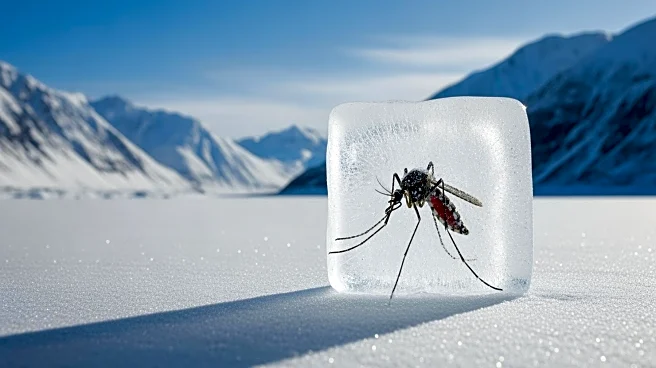What's Happening?
Iceland has reported its first confirmed sighting of mosquitoes in the wild, marking a significant ecological development for the country. The discovery was made by Björn Hjaltason in Kiđafell, Kjós, about 20 miles north of Reykjavik. Hjaltason captured
three mosquitoes, which were later identified by entomologist Matthías Alfreðsson as belonging to the Culiseta annulata species. This species is known for its adaptability to colder climates, which allows it to survive harsh winters. Previously, Iceland's extreme cold had prevented mosquitoes from establishing themselves in the natural environment. The presence of these mosquitoes raises questions about how they arrived in Iceland, with theories suggesting they may have been transported via ships or containers. Further monitoring is planned to determine if the species can survive the winter and establish a permanent presence in Iceland.
Why It's Important?
The discovery of mosquitoes in Iceland is significant as it may indicate broader ecological changes potentially linked to climate change. Mosquitoes are known carriers of diseases and their presence in new regions could pose public health challenges. As global temperatures rise, the habitats suitable for mosquitoes expand, potentially increasing the spread of mosquito-borne diseases. Iceland's recent record-breaking heat, which was significantly influenced by climate change, could be a factor in making the environment more hospitable to these insects. The situation underscores the need for ongoing monitoring and research to understand the implications of climate change on species distribution and public health.
What's Next?
Entomologists and environmental scientists will continue to monitor the situation in Iceland, particularly through the upcoming spring, to assess whether the Culiseta annulata species can survive the winter and establish a permanent population. This will involve tracking the mosquitoes' ability to reproduce and adapt to Iceland's climate. The findings could inform broader studies on the impact of climate change on species migration and adaptation. Additionally, public health officials may need to prepare for potential mosquito-borne disease risks if the species becomes established.
Beyond the Headlines
The presence of mosquitoes in Iceland could have deeper implications for understanding the effects of climate change on global biodiversity. It highlights the potential for unexpected ecological shifts as species adapt to changing climates. This development may prompt further research into the resilience and adaptability of other species in response to climate change, as well as the potential for new ecological interactions and challenges.

















